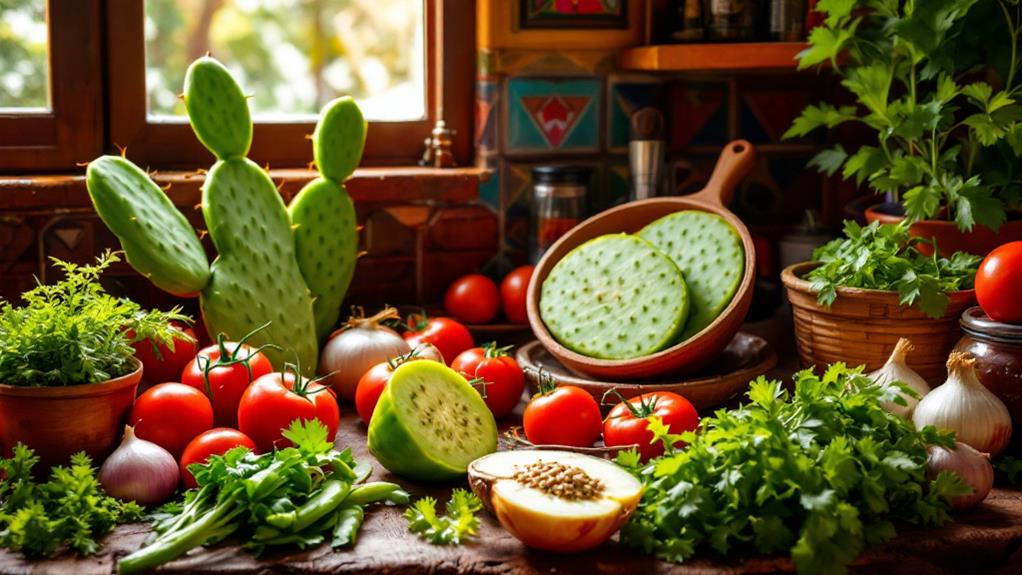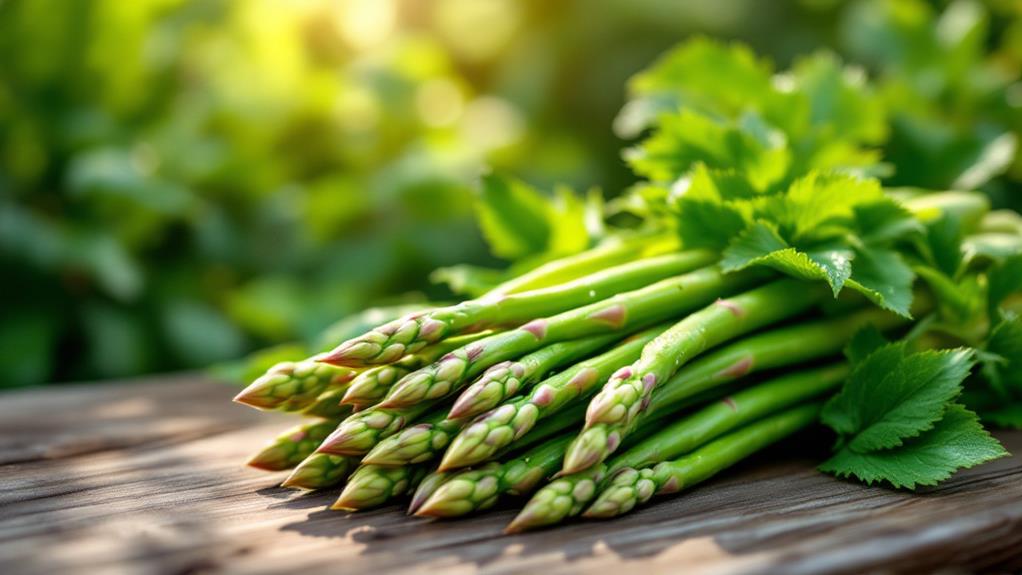What Is Chayote and What Are Its Health Benefits?
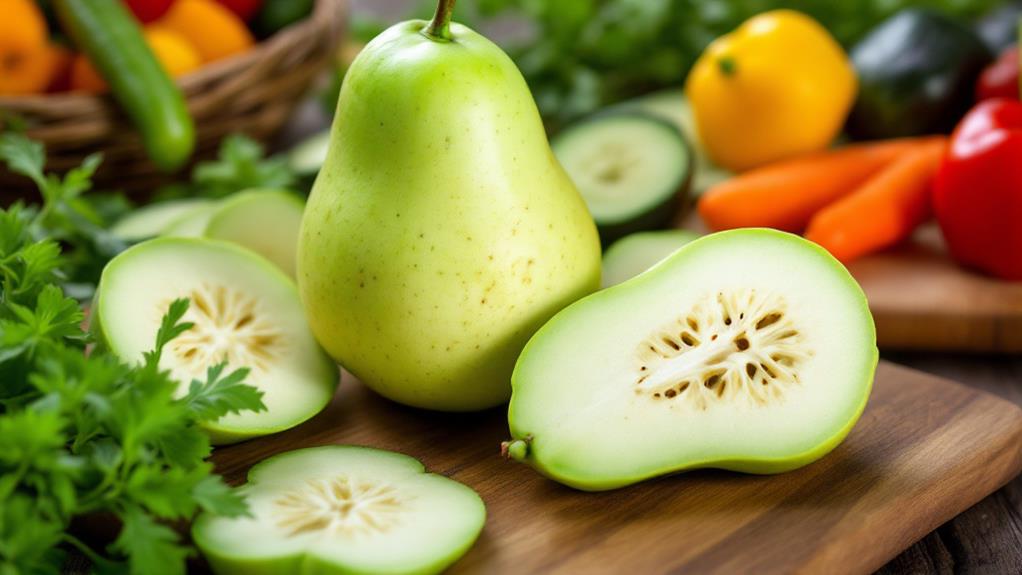
Chayote is a versatile, nutrient-dense fruit that's low in calories and high in water content, making it great for hydration and weight management. It packs vital vitamins and minerals like vitamin C, potassium, and B6, supporting immune function and heart health. With 3 grams of fiber in a medium-sized fruit, chayote promotes digestive well-being. Its mild flavor and crunchy texture make it a perfect enhancement to salads, soups, and stews, and you can enjoy it raw or cooked. Curious about how this powerhouse can further boost your culinary and health game? There's more to uncover about chayote's benefits.
Understanding Chayote
Chayote, scientifically named Sechium edule, is a fascinating fruit that often masquerades as a vegetable in the kitchen. When you incorporate chayote into your meals, you're choosing a food that's not only low in calories but also packed with health benefits. This fruit contains only 19 calories per 100 grams, making it an excellent choice if you're watching your calorie intake. Furthermore, its high water content—about 94%—ensures it's hydrating, perfect for keeping you refreshed.
Beyond its hydrating qualities, chayote is a powerhouse of vital vitamins and minerals, including vitamin C, vitamin B6, calcium, magnesium, and potassium. These nutrients contribute to overall wellness and support heart health by maintaining healthy blood pressure levels. The dietary fiber in chayote, 1.7 grams per 100 grams, aids digestion and helps you feel full, which can be beneficial if you're managing your weight.
Chayote's versatility in cooking allows you to enjoy it raw in salads or cooked in soups, stir-fries, and casseroles. Its antioxidants further enhance your health, protecting your cells from damage. Incorporate chayote in your diet to reap its numerous health benefits.
Nutritional Profile
When exploring the nutritional profile of this unique fruit, you'll find it to be a remarkably low-calorie choice, perfect for those mindful of their weight. With just 19 calories per 100 grams, chayote fits seamlessly into a calorie-conscious diet. But it's not just about keeping the calorie count low; chayote offers more than that. Each serving contains 1.7 grams of fiber, supporting your digestive health and helping you feel fuller longer, which can be a boon for weight management.
Chayote isn't just low in calories; it's packed with vital nutrients. A cup of cooked chayote provides 12.8 mg of vitamin C, which is about 14% of your daily value, helping bolster your immune system and acting as a powerful antioxidant. You'll also find 125 mg of potassium in every 100 grams, significant for maintaining cardiovascular health. Moreover, chayote's 94 grams of water content per serving guarantees excellent hydration, making it a rejuvenating and nourishing choice.
The combination of calcium and vitamin B6 further enhances chayote's appeal, supporting bone health and comprehensive wellness. This nutrient-dense fruit truly offers a range of health benefits while keeping your diet light and nutritious.
Health Benefits
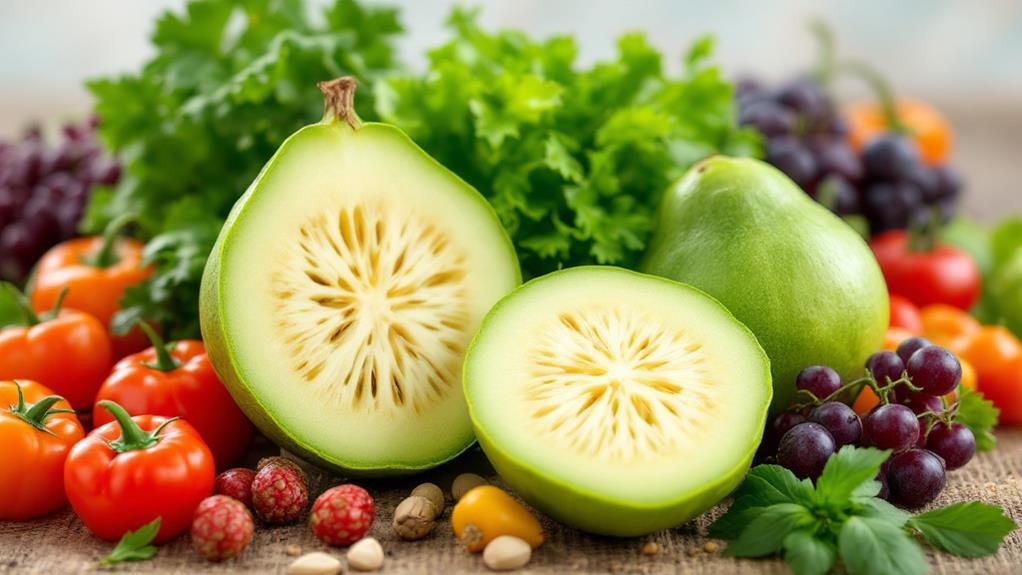
Investigate the health benefits of chayote, and you'll uncover a wealth of advantages that extend beyond simple nutrition. Packed with crucial vitamins and minerals, chayote offers significant amounts of vitamin C and folate, supporting both immune function and fetal development. But that's just the beginning of its benefits. Regarding digestive health, chayote's high fiber content is a game-changer. With 3 grams of fiber in a medium chayote, it aids regular bowel movements and improves gut bacteria, keeping your digestive system in top shape.
Chayote also plays an important role in maintaining heart health. Its potassium content, at 125 mg per 100g, helps regulate blood pressure and supports proper insulin production. Regular consumption has been linked to lowering blood pressure, with studies showing reductions of 7 mmHg in systolic and 4 mmHg in diastolic readings.
Antioxidants in chayote, such as flavonoids and polyphenols, combat oxidative stress, reducing the risk of chronic diseases like heart disease and cancer. By incorporating chayote into your diet, you're not just enjoying a delicious vegetable; you're investing in your long-term health and wellbeing.
Culinary Uses
Embracing the diverse culinary potential of chayote can improve your dishes with ease. Chayote, with its mild flavor and satisfying crunch, is perfect for raw preparations like salads or slaws. You'll find it adds a revitalizing texture without overwhelming other ingredients, making it an ideal low-calorie, high-fiber choice for those looking to manage weight while enjoying flavorful meals.
In the kitchen, chayote is a versatile ingredient. You can easily incorporate it into your cooking routine by boiling, steaming, roasting, or stir-frying. Its adaptability means it works wonderfully in soups and stews, absorbing and complementing the flavors of your favorite recipes. Chayote doesn't stop at just the fruit; you can also use its skin, seeds, and even young leaves, which can be brewed into teas or cooked as greens.
In traditional Latin American dishes, chayote often substitutes other vegetables, proving its compatibility with a wide range of flavors and cuisines. Regardless of you're exploring new culinary uses or sticking to beloved traditional dishes, chayote's versatility guarantees it can easily uplift your meals without adding unnecessary calories. Give it a try, and uncover how this humble vegetable can transform your cooking.
Storage Tips
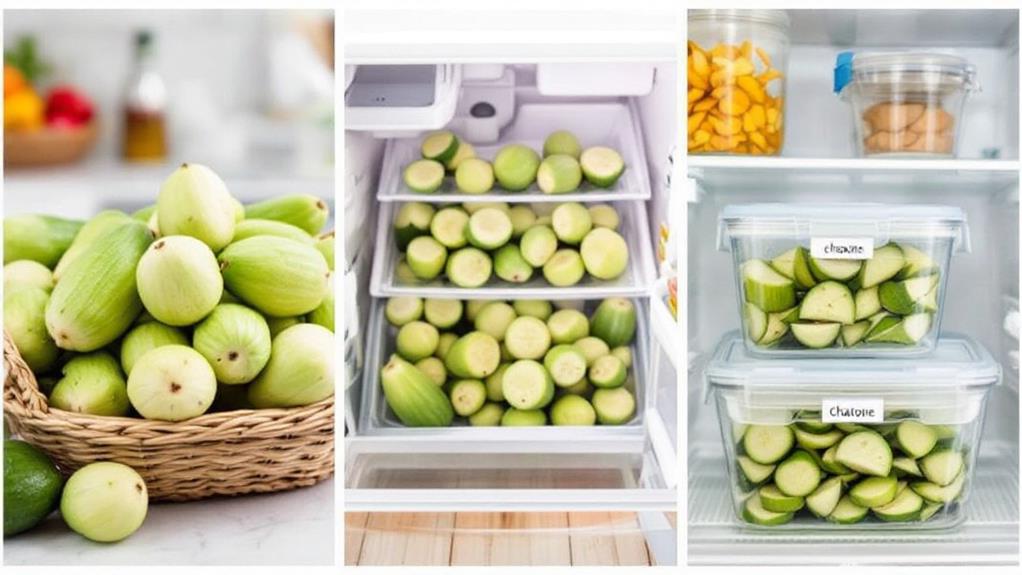
After exploring the culinary versatility of chayote, knowing how to store it properly guarantees you always have fresh ingredients at hand. Start by understanding that chayote has a limited shelf life at room temperature, typically just a few days. To extend this, refrigeration is your best bet, keeping it fresh for up to a month. One of the most effective storage tips is to place chayote in an airtight container or plastic bag, which helps prevent moisture buildup. This is essential, as excess moisture can lead to spoilage, compromising the quality of your produce.
Store chayote in a cool, dry place, away from direct sunlight, to maintain its quality. If you have cut chayote, wrap it tightly in plastic wrap before refrigerating. This prevents it from drying out or absorbing unwanted odors from other foods. Regularly inspect your stored chayote for signs of spoilage. Look out for soft spots or mold, and discard any compromised pieces to guarantee you're using only fresh produce. With these storage tips, you'll keep your chayote in top condition, ready for your next delicious recipe.


